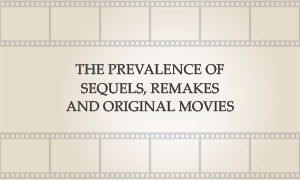 Over the weekend, I saw Avengers: Infinity War. I shall avoid talking about the actual movie so you don’t have to worry about spoilers here. What I do want to discuss is originality amongst top movies. Before the Avengers began saving the world, we were treated to trailers for nothing but sequels, prequels and other movies based on existing material.
Over the weekend, I saw Avengers: Infinity War. I shall avoid talking about the actual movie so you don’t have to worry about spoilers here. What I do want to discuss is originality amongst top movies. Before the Avengers began saving the world, we were treated to trailers for nothing but sequels, prequels and other movies based on existing material.
While hardly a scientific way of judging all of Hollywood’s output, it did underline the issue for me. 2018 is going to be a bumper year for such movies, with cinemas showing:
- Sequels such as Mamma Mia! Here We Go Again, Sherlock Gnomes, Johnny English Strikes Again, X-Men: Dark Phoenix, Pacific Rim: Uprising, Fifty Shades Freed, Maze Runner: The Death Cure, Deadpool 2, The Equalizer 2, Super Troopers 2, Wreck-It Ralph 2, Creed 2, Paddington 2, The Incredibles 2, Sicario 2, Hotel Transylvania 3, The Purge 4, Mission Impossible 6.
- Prequels such as The First Purge, The Nun, Solo: A Star Wars Story, Fantastic Beasts: The Crimes of Grindelwald (which is also a sequel)
- Spin-offs such as Aquaman, X-Men New Mutants, Black Panther, Bumblebee, Ant-Man and the Wasp (also a sequel).
- Remakes and reboots such as Halloween, Mary Poppins Returns, The Predator, Tomb Raider, Ocean’s 8 (despite its name, not a sequel).
- Adaptations such as The Jungle Book, Vemon, Rampage, Goosebumps: Haunted Halloween, 12 Strong, Peter Rabbit, Every Day, The War with Grandpa, Red Sparrow, A Wrinkle in Time, Love Simon, Ready Player One, Where’d You Go Bernadette, The Darkest Minds, Rich Crazy Asians, Boy Erased, First Man, The Girls in the Spider’s Web, Mary Queen of Scots, How The Grinch Stole Christmas, The Guernsey Literary and Potato Peel Pie Society, Little Women, The Bell Jar, Bel Canto and many more…
Oh and, Jurassic World: Fallen Kingdom which seems to tick most boxes as it’s a sequel to a spin-off from a previous series, which itself contained an adaptation and then two sequels.
Over the years, I have looked at the originality of modern movies in a few different ways. My findings in those articles still stand, although as time moves on the data becomes increasingly out of date. Therefore, I thought it would be interesting to update the key charts and link to the relevant full articles if you want to know more.
Movie Adaptations
In all but two of the past thirteen years, over half of all top-grossing movies have been adaptations.
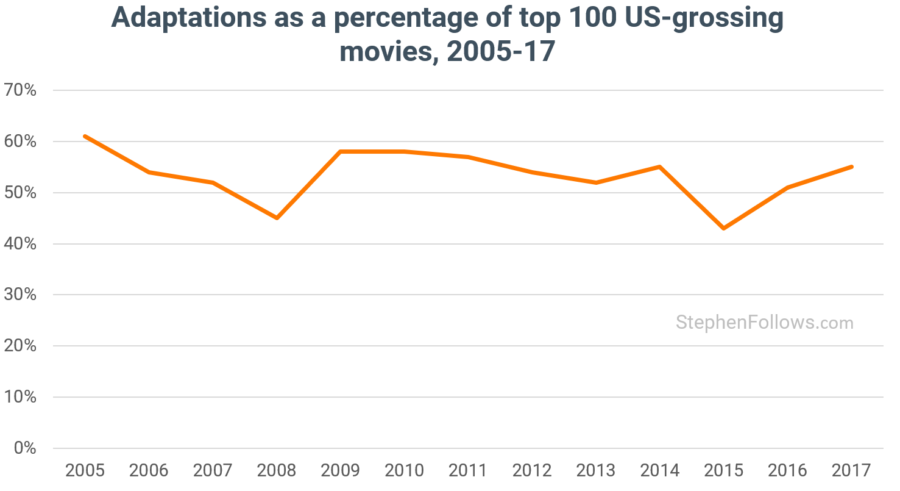
Although the overall trend is fairly flat (an average of 53% of such movies being adaptations), the source of these adaptations has shifted quite a bit. Comic book and graphic novels have become more popular, at the cost of fiction books and television adaptions.
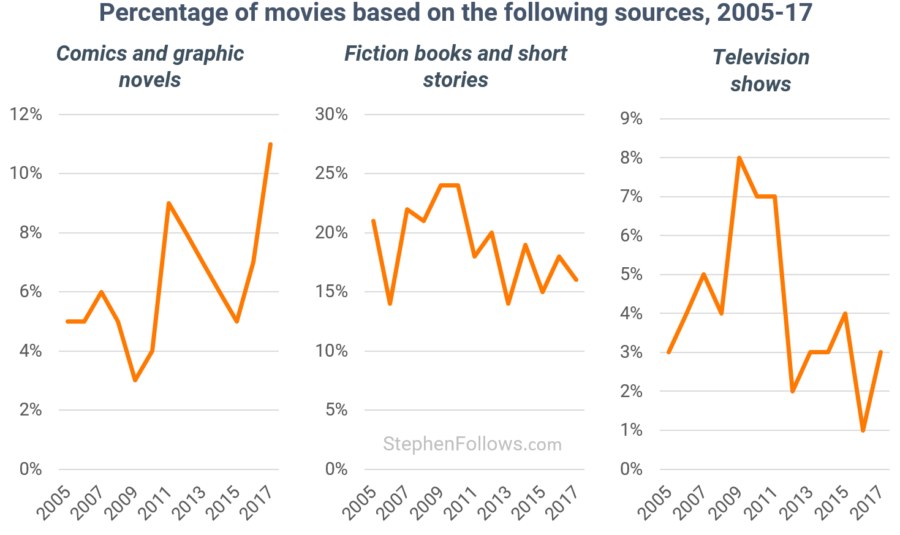
Further reading: How original are Hollywood movies?
Sequels and prequels
Sequels and prequels now account for almost a third of all top-grossing movies – twice the level of ten years ago.
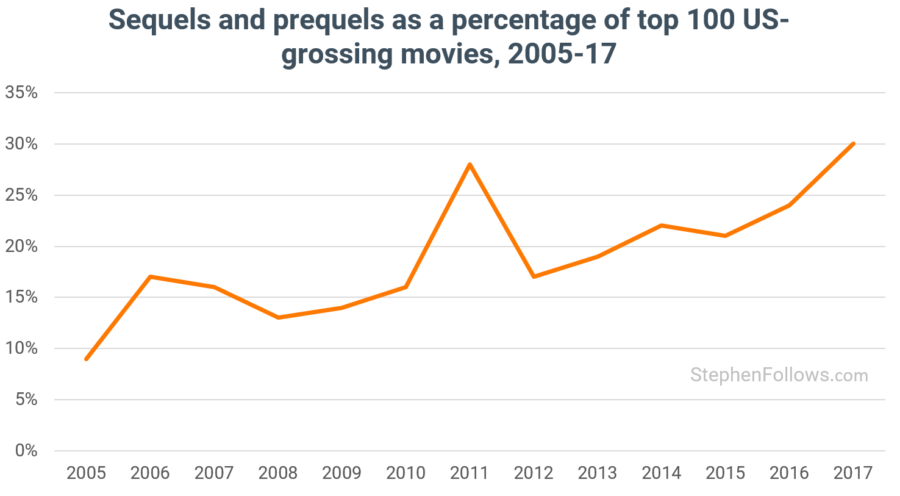
Further reading: Hollywood sequels by the numbers
Remakes and reboots
Another significant trend has been the falling out a favour of reboots and remakes. In the mid-2000s, almost one in six top-grossing movies was a re-imagining of a previous movie whereas recently this has fallen to nearer one in twenty-five.
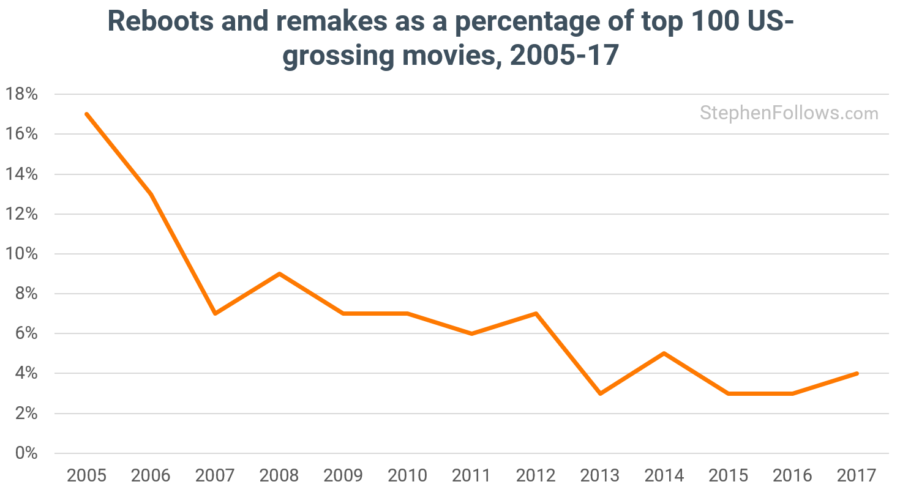
Further reading: The scale of Hollywood remakes and reboots
Based on real-life events
A few years ago, I wrote about the boom in movies based on real-life events. Since then, the trend has started to wane, with the peak being back in 2012 when 29% of movies were inspired by real-world incidents.
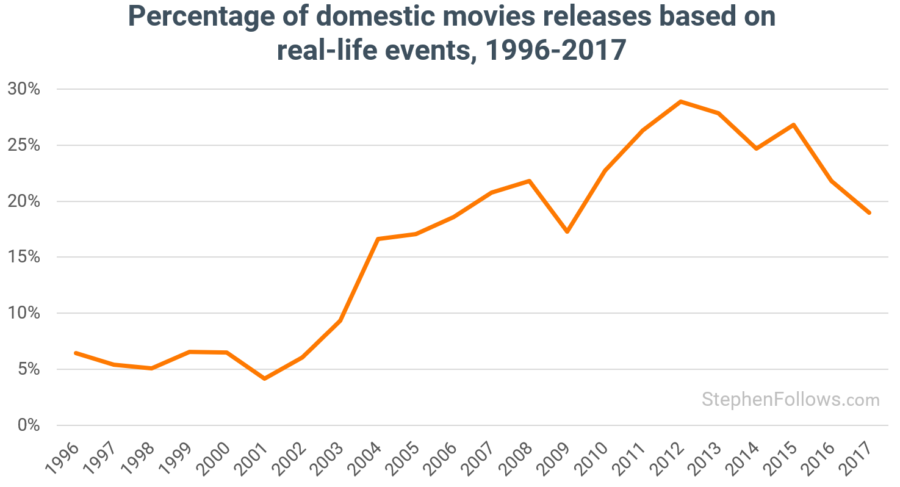
Note: For the chart above, I am looking at all movies released each year, not just the top-grossing movies as I have done for previous sections thus far. That’s because the vast majority of real-life movies fall out of the top 100 and so to get an idea of the true scale, we need to zoom out a bit.
Further reading: How many movies are based on real-life events? and Are movies based on true stories better than fictional stories?
The effect on the colon of all this recycled material
Finally, when conducting the research for today’s article, I noticed that a large number of movies are faced with the tricky challenge of both telling cinemagoers that they are a new movie, and also giving them a clue as to the movie’s pre-existing source.
In many cases, the answer is the use of a colon; either with the previous movie’s name before it (such as Fantastic Beasts: The Crimes of Grindelwald and Jurassic World: Fallen Kingdom) or by providing a few explanatory words after it (such as Solo: A Star Wars Story and T2: Trainspotting). This got me thinking about how many movies use colons and, well, I ran the numbers.
In the late 1990s, around 4% of movies used a colon, whereas in 2017 it was 12% (i.e. one in eight movies).
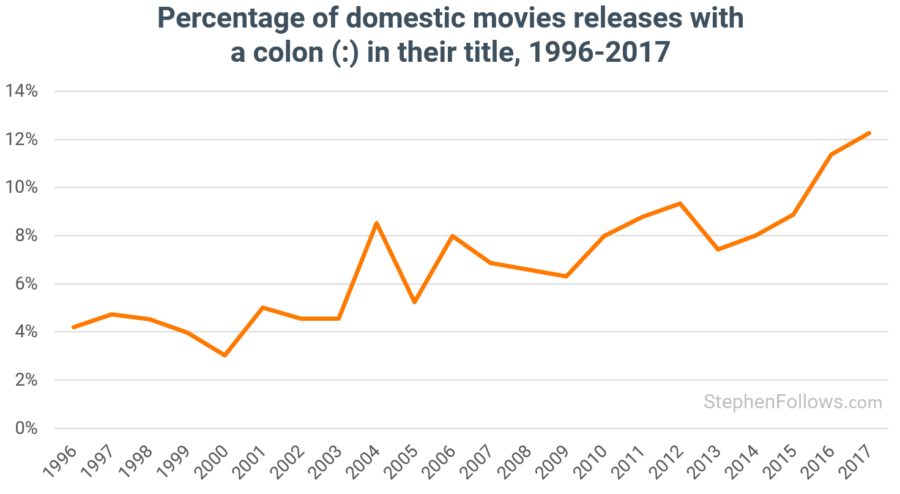
This covers not just sequels but also movies which use them for comedic effect (i.e. Popstar: Never Stop Stopping), to explain the movie’s contents (i.e. Bombshell: The Hedy Lamarr Story) and just ‘coz (i.e. Mission: Impossible).
Notes
The data for today’s work came from IMDb, The Numbers / Opus, Box Office Mojo, Movie Insider and Wikipedia.
For each topic, it’s worth clicking through and reading the notes at the end of the articles as some of these topics have important definitions, caveats and subjective judgments on my part.
I have focused on the top 100 US-grossing movies of each year because I am interested in the biggest and loudest movies. The top 50 grossing movies each year account for around three-quarters of the entire box office (both domestically and in the UK) and so by looking at the top 100 we are covering the vast majority of tickets sold, and almost all of the money spent on advertising.
Epilogue
Personally, I’m not that bothered by the lineage of a movie’s core concept. Some of my favourite films have had long, complicated histories. For example, The Dark Knight is the sixth big-screen Batman movie and is a sequel to a reboot to a comic book adaptation and yet is a terrific movie. Plus, some of the worst films I have seen have been original screenplays.
At the end of the day, the number of previous expressions of an idea does not ultimately mean that the filmmakers have to create something of poor quality. Now, the lazy, derivative commissioning of movies in a paranoid, risk-adverse, one-sheet focused, star-driven Hollywood studio culture – that’s another story….

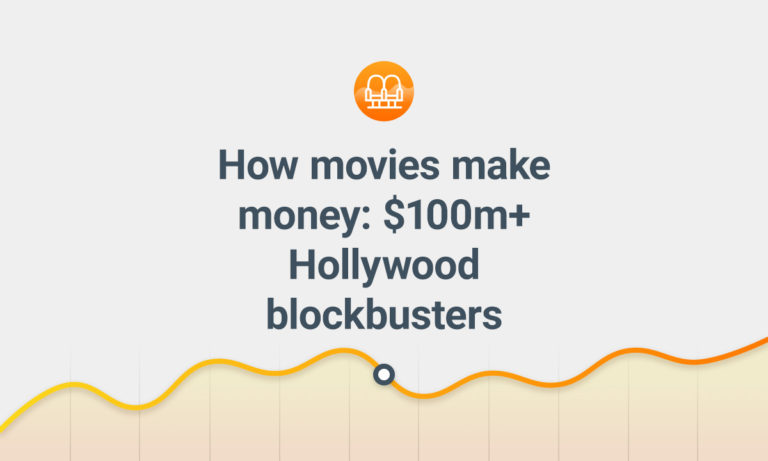
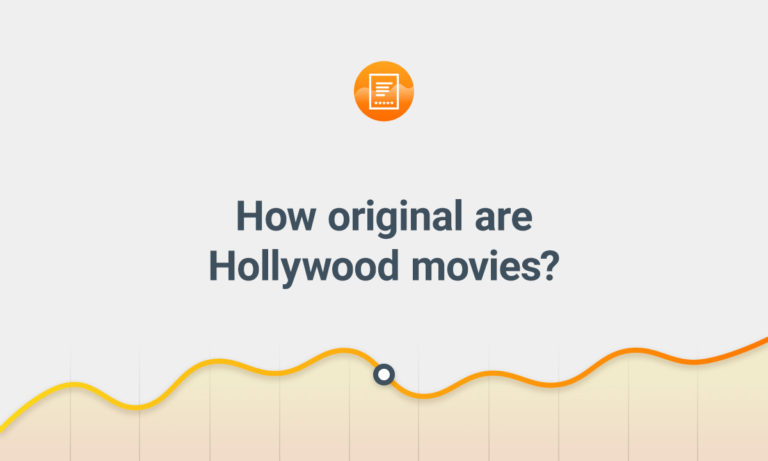
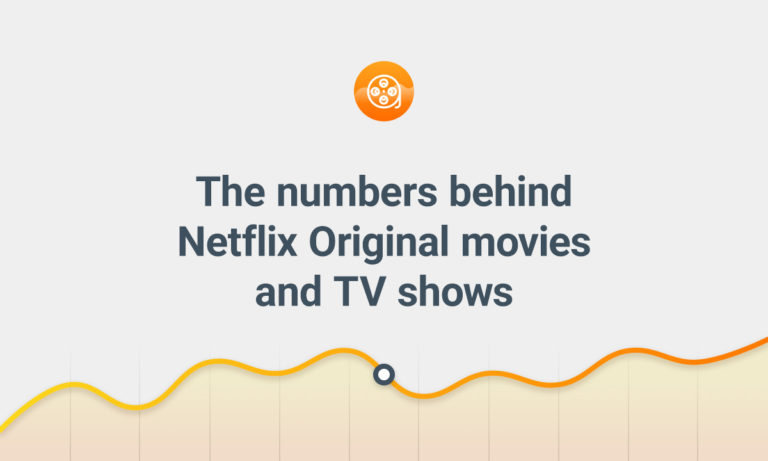

Comments
As ever, Stephen, fascinating analysis.
Did you ever look into the idea I floated a couple of years ago: films where the completion bond has been called?
Hi Martyn. It remains a good idea and remains on my list of ‘possible topics’. I tried to look at it previously but I need a data partner or a research brainwave to make it work.
Have you tried Film Finances? They might support this if there is a clear educational gain, making your readers aware of pitfalls to watch out for, to your posting.
very interesting analysis, like always !
Hi Stephen, great article as usual. As I work with a catalogue myself, I have experience first hand that working off a successful source (be it a play, article, novel), it’s almost ingraned in British film-making. At ABPC in the fifties it was pretty much company policy…If you want to look at completion bonds, I believe there is at least one of these companies that is very open to research work.
Interesting that reboots have fallen away. Perhaps financiers saw the remake of Point Break and realised the folly of their ways.
Love it. I sent you an email. I hope to see something more in-depth on Adaptions alone. BRAVO!!
I now think that the previous film was for a certain company. The preparation period will only be so long, and the goods will be sold at the same time.
Nowadays, the film is a remake and the shadow of a company is added. At the time of distribution, novels, companies, and prequels can also be sold.
I still think the movie is a two-hour advertisement.
Hey Stephen,
This is just the data I was looking for, and framed in an excellent fashion.
Thanks for your fine work, you’ve saved me a bunch of time!
I hope to use this information in crafting some heretically “original content.”
That being said, I may have to borrow a bit from your work,
Do you mind me using your charts and graphs, with attribution?
I do not intend to sell or profit from any of it 😉
Yes, you can use one or two charts in a non-commercial way. Please let me know how and where they’re used. Good luck with your project! S
I love the final bit about the colon. Punctuation matters as field of meaning and research methodology!
hey! did you use an open access database for this post? if yes, can you tell me where to access it? I’d like to make a similar analyis for a school project. thanks in advance!
Hi Benjamin. I’m afraid not, this is my database.